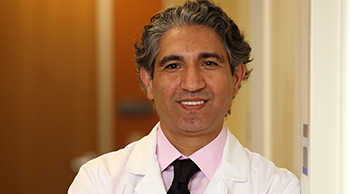
Ask the Expert: Weight loss surgery — Is it for you?
An interview with Saber Ghiassi, MD, site director, Yale Bariatric and Gastrointestinal Surgery program at Bridgeport Hospital
Q: The Yale Bariatric and Gastrointestinal Surgery Program expanded to Bridgeport Hospital in 2015. How has the program grown?
Recently, the Bridgeport Hospital program earned accreditation as a comprehensive bariatric surgery program from the Metabolic and Bariatric Accreditation and Quality Improvement Program. Our program meets the highest standards for patient safety and quality care.
Q: How was this accreditation achieved?
We developed a Bariatric Surgery team that collaborates for a patient's care. this team includes physicians, nurses, registered dietitians, psychologists and rehabilitation therapists working in a dedicated care unit for patients who undergo weight loss procedures.
Q: Why is a dedicated care unit important?
Bariatric patients typically require special care and facilities. the staff are specifically trained to anticipate and respond to the needs of bariatric patients. For example, many of our patients have diabetes, which is more likely in people who are obese.
Q: Is it true that bariatric surgery can cure diabetes?
For many patients, this is true. Bariatric surgery alters a patient's metabolism and triggers the body to produce insulin again. We are researching how the surgery kickstarts this insulin production. Bariatric surgery balances hormones that tell you when you're hungry and full, which reduces the appetite. It also causes the body to burn more calories.
Q: Is bariatric surgery for anyone who wants to lose weight?
No. Patients must have a body-mass index of at least 35. Also, they must be psychologically ready to make a lifelong commitment to changing their eating habits. That's why we hold monthly informational forums and conduct a psychological evaluation of every candidate for surgery, so that patients can commit to keeping weight off for the rest of their lives. Gaining back weight after bariatric surgery is dangerous because of the reduced size of the stomach

